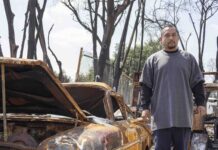ELLIOT GOLAN / Bull
Charlie sits against the wall behind Jerry’s Famous Deli in Woodland Hills. He strokes his sandy, gritty white beard as he reads the latest issue of the Los Angeles Times.
He takes a quick, purposeful drag from the Pall Mall Light cigarette hanging limp in the right corner of his mouth. He coughs. Charlie says there are cheaper cigarettes available, but he won’t settle for those. He says they’re nasty.
After reading the Times, he moves on to The Daily News to get “the community feel.”
“Gotta act like you know it all,” says Charlie, grinning.
His dark and dirty face shrinks when he smiles. He is careful not to allow his teeth to surface, as they are disfigured and colored the dark yellows and browns from antismoking commercials.
Charlie is wearing a a dark green polo shirt and ragged blue jeans. Around his neck is an Ed Hardy charm he says he found.
Charlie is well-known around the parking lot at the Northeast corner of Topanga Canyon and Ventura Boulevards. Some know him because of the penny whistle he plays at night. Some know him from his morning routine of coffee and newspapers. The massive amount of foot traffic through the plaza has seen him there for more than 35 years.
The employees of the deli are lined up along the wall, chatting, smoking and joking in Spanish. None of them talk to Charlie, but exchange nods as they walk by. Motorists driving by don’t appear curious about the 53-year-old homeless man sitting on the milk crate to their side.
It often seems as though he is a part of the parking lot. Much like a sidewalk or parking stop that does not require specific attention.
Few stand near him, due to the overwhelming stench of beer mixed with cigarettes that emanates from him.
Looking at Charlie can be unsettling. His skin is worn from too many years in the sun. His nose is covered in what appear to be biblical-grade boils. Though you’ll never see him with a sign asking for money, his appearance clearly identifies him as homeless. It is estimated that on any given day last year 57,166 people were unsheltered in Los Angeles, according to Alvaro Cortes, a staff member for Abt Associates. Founded in 1965, Abt is a research firm that helps prepare the Annual Homeless Assessment Report for the U.S. Department of Housing and Urban Development. Charlie doesn’t really fit in to those statistics. Homeless by choice, Charlie prefers his life the way it is.
“It gets addictive,” says Charlie. “No boss, no wife, no kids, no mortgage, no 401k account.”
“‘On the streets’ is an ambiguous term,” says Charlie, sarcastically. Eloquent and well-spoken, it’s hard to imagine him as having been homeless for the greater part of his life. Charlie says he was an extra in the 1987 horror film, “The Lost Boys.” He claims he finally got around to picking up a 21-year-old residual check in October totaling more than $200.
Most of his money is spent on beer. He only eats once a day. Charlie gets much of his clothing from his “patrons,” including the brand new black “Kangaroos” sneakers on his feet.
Charlie was born Bryan Joseph Hunt on May 5, 1956. When Charlie arrived in Topanga, he said he wanted a stronger, “manly” name.
“You know, Mike, Chuck, something like that,” he says.
Nobody in the area calls him anything other than Charlie.
Audrey Waters, 49, has lived in the area since she was 10. Her first memories of Charlie start when she was 11 years old. She says that since then she has “never, never, never” gone a year without seeing him. “I look at this parking lot as belonging to Charlie,” says Waters.
A daily customer of the Coffee Bean and Tea Leaf in the parking lot, Audrey sees Charlie every day. “He offers to buy me coffee all the time,” says Waters, jokingly. “He’s just another neglected child of the 60s,” she says as she takes a seemingly endless drag of her cigarette. She never appears to exhale. She considers Charlie to be an amazing artist and musician. She reveres both his penny whistle playing and his ability with an Etch-a-Sketch.
“What a waste,” she says shaking her short, dirty-blonde hair.
Charlie claims he’s the product of foster care. He was picked up by a couple of hippies while hitchhiking his way to the beach from Sunset Boulevard when he was 15 years old. They took him to Topanga Canyon.
“The rest is history,” he says, although it’s Charlie’s history and it’s difficult to confirm.
Playing the penny whistle and selling marijuana is how he has stayed afloat so long. “I have good business ethic,” insists Charlie. “A decent bag for a decent price.”
He outlined his method of survival in clear business terms. “Give blood for $10. Buy a soda and sandwich for five and a $5 bag of weed,” he says, counting the steps on his dirt-smudged fingers. “Roll ten joints and sell them for $1 a piece. You do the math.”
He also makes money from his penny whistle playing. Charlie estimates that he can make $25 in four hours of playing.
Although he lives in the parking lot, he sleeps under the 101 freeway at Topanga Canyon Boulevard. “Gotta keep it simple or Caltrans will haul it all away,” says Charlie. “Just a mattress and a blanky. Cardboard condos get hauled away.”
Charlie looks at his Rite-Aid bought, pay-as-you-go, cell phone for the time. “Know what time it is?” he asks with a sinister smile.
“It’s beer thirty,” he says.
It’s 11:30 a.m.
Charlie defines “beer thirty” as whatever time it is when his first yearning for “the famous Budweiser” surfaces. This can happen anywhere from the time when nearby Carlson’s Liquor opens at 8 a.m., but it’s rarely later than noon.
Depending on income, Charlie says he’ll go through up to a dozen 24-ounce cans of beer a day. Though he says many businesses in the parking lot offer him discounts, he complains that Carlson’s never does.
Of all the businesses, The Chop Shop is most friendly to him. A modernized barber shop located next to Charlie’s morning coffee shop, The Coffee Bean and Tea Leaf, has allowed Charlie to use their place as his mailing address. He recently got an updated drivers license sent there, claiming he needed a valid ID to pick up his residual check.
“He’s like a staple around here,” says Bryan Shefflin, 37, a barber at the shop. Dressed in all black, with tattooed sleeves down both arms, Shefflin sees Charlie in a different light.
“He’s not like most of the derelicts around here,” he says shrugging and gesturing at the parking lot.
Shefflin spoke of the drunk and disorderly homeless people that can be seen in the lot at different times. “But Charlie doesn’t bother anybody,” he says.
Shefflin is also quite fond of Charlie’s artistic specialty, describing an Etch-a-Sketch portrait of Osama Bin Laden that Charlie once created. “He does amazing work,” says Shefflin. “When you got all that time on your hands, you can be as careful as you want.”
Another employee at The Chop Shop, Justin Lackie, cuts Charlie’s hair and beard once every six months or so, free of charge. Though Shefflin was unaware of Charlie’s drinking and smoking, Lackie was well versed.
“I’ve smoked pot with him before,” says Lackie, as he exhales his cigarette smoke with a laugh.
Meanwhile, Charlie passes in front of the barber shop, coughing severely and putting his fingers into the peace sign. Lately, Charlie’s health has begun to deteriorate.
“40 years without even a head cold and then boom,” Charlie exclaims. Raising his voice causes another cough.
Charlie says he was diagnosed with colon cancer in June. Olive View Hospital did confirm that Charlie was a patient, but could not confirm the purpose of his visit due to patient privacy laws. He also says he suffered a stroke in September.
“If he doesn’t get help soon, he’s going to have a big problem,” says Waters.
As she speaks, Shefflin chimes in. “Dead, dead, dead.”
His health has made it difficult for Charlie to play the penny whistle. “It’s getting pretty hard to play,” says Charlie. “I’m getting kinda weak.”
As Charlie cracks open another beer, he moves a cardboard box to block it from view. Charlie says he has received more than 30 tickets in the area for drinking, but that he never pays them.
“At least they let me finish my beer,” Charlie says. “You get brownie points for being discreet.”
Charlie’s plans for the future are both large and thought out. Charlie plans to cut a music record.
“There are a variety of styles I can do,” says Charlie proudly. “Jazz, rock, Celtic, folk.” Charlie says he has already released an album entitled “Charlie’s Christmas Songs.”
Though a copy of the CD proved difficult to track down, Shefflin says The Chop Shop used to have a copy. Charlie also plans to use his Etch-a-Sketch art toward his business goals.
“You really don’t need economics 101,” insists Charlie. “Nobody can do Etch-a-Sketch like I can.” Charlie went on to offer a challenge at “high noon” to any other Etch-a-Sketch artist.
“I’d like to publish one of those coffee table hard bound books of all my art,” says Charlie. He outlines how one page would be the art and the corresponding page would tell a little of his story.
Charlie is confident in his abilities to sell either of these ideas.
“I have my fan base,” says Charlie, gesturing his arms toward the lot. Until any of those plans take off, Charlie isn’t going anywhere. He says he is happy where he is and is comfortable “biding his time.”
Waters is concerned about how much time Charlie has left. She says she feels safe when Charlie is in the lot and she believes him to be a part of her life. “I would miss Charlie more than you ever know,” says Waters. “He’s a part of Woodland Hills.”
As the sun sets, Charlie rises gingerly from the wall. He throws away his freshly finished can of beer, number four, and pulls the penny whistle out of his right pocket.
Just another day for Charlie. Much like yesterday and much like tomorrow shall be.

Charlie plays his penny wistle for an empty paking lot in front of Rite Aid at the corner of Ventura and Topanga Boulevards. (Jared Iorio / Bull)

(Bull)



